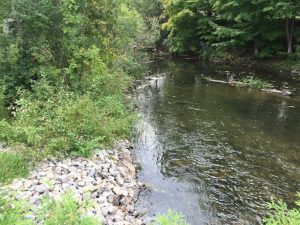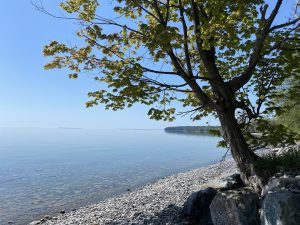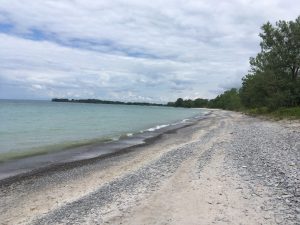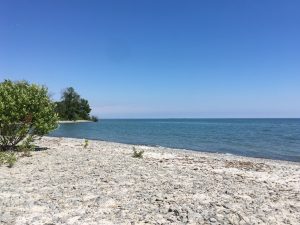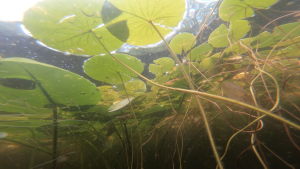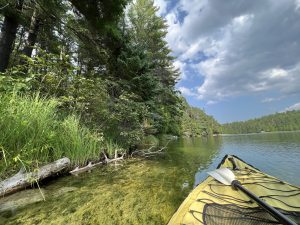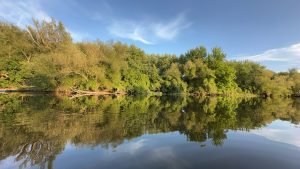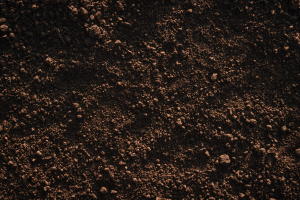by Paige Jessup, Climate Resilience Intern Christmas does not have to be the only thing you look forward to this winter! There are lots of ways you can enjoy the outdoors and spend time with your family. Here is a list of 10 things you can do this winter to get you started on connecting with nature, supporting your local ecosystems, and having fun with loved ones! 1. Snow Painting Make the world your canvas! On the day of a beautiful, fresh snowfall, take a spray bottle and fill it with ... Read More
Why ‘Soft’ Shorelines Are More Beneficial to your Shoreline Property
by Alana Coloumbe, Education programs administrator Shorelines are the interface between land and bodies of water that are important for both humans and wildlife. Shorelines facilitate the exchange of resources between aquatic and terrestrial ecosystems, and therefore affect the functioning and ecological condition of both ecosystems (Wensink & Tiegs, 2016). Recent human developments for industrial, commercial, recreational, and residential purposes have threatened shoreline stability ... Read More
The Dynamic Coastlines of the Laurentian Great Lakes – Part 3
by Ty Fischer, Riparian Health Restoration Intern This is part 3 of a series on the Great Lakes. To read the first part, please click here; part two is found here. Erosion is a common problem on coastal bluffs and beaches on the Great Lakes’ coastlines. Despite the ubiquity of hardened shoreline structures in the region to manage these issues, such options are often not ideal since they are prone to failure and can disturb important natural processes and native species. Other large-scale ... Read More
The Dynamic Coastlines of the Laurentian Great Lakes – Part 2
by Ty Fischer, Riparian Health Restoration Intern This is part 2 of a series on the Great Lakes. To read the first part, click here. With water level fluctuations operating on daily, seasonal, and annual cycles, and with frequent disturbances from high winds, large waves, seiches, and storms, the Laurentian Great Lakes are truly dynamic freshwater systems. As a result, they display a diverse range of coastline types ranging from steep coastal bluffs to vast sandy beaches that are highly ... Read More
The Dynamic Coastlines of the Laurentian Great Lakes – Part 1
by Ty Fischer, Riparian Health Restoration Intern Reaching up to hundreds of kilometers wide and hundreds of meters deep, it is perhaps not surprising that the Laurentian Great Lakes share many geological similarities with saltwater oceans. They have high winds, large waves, and even complex current systems that in many ways make them dynamically closer to being inland seas than typical freshwater lakes (Rao, Schwab, 2007). As a result of these strong hydrological processes, their coastlines ... Read More
The Benefits of Aquatic Vegetation for Wildlife and Freshwater Health
by Ty Fischer, Riparian Health Restoration Intern Aquatic plants in our lakes and rivers are often referred to as ‘weeds’, and the use of this term shows how they are generally perceived by waterfront property owners – as a nuisance. This is because the vegetation can get tangled in boat motors, tickle the toes of swimming passerby, complicate fishing endeavours, and is just generally seen as an unattractive part of the waterway. The irony is that every single amenity offered by our lakes ... Read More
Riparian Zones and Climate Change
by Nathaniel Sneyd-Dewar, Riparian Habitat Restoration Intern Shoreline properties are located on the frontline of climate change as many environmental functions and processes are pronounced at this critical area for biodiversity and the water cycle. Shoreline properties exist in the riparian area (within 30m of the shoreline), which is a vital region for ecosystem and environmental resilience and can be considered the “ribbon of life”. The immense diversity and connection between land and ... Read More
Shoreland resilience under a changing climate
by Alana Coulombe, Education programs administrator Canada’s freshwater is under threat against the impacts of climate change, in addition to shoreland development and traditional land use practices. Increasing climate change pressures and associated hydrologic changes will alter where, when, and how precipitation falls and water flows. This, in turn, will impact the quantity, quality, and availability of Canada’s freshwater resources. The cumulative effect of these multiple stressors, along ... Read More
Soil: More Important and Fascinating Than It Seems
by Ty Fischer, Riparian Health Restoration Intern You may not often offer it much consideration when you are walking over it or planting in it, but soil is a wonderfully complex and extraordinarily important thing that both us and our native wildlife owe much of our lives to. Soil is necessary for the growth of plants, which are primary producers. These are organisms that harvest energy from the sun and transform it into chemical energy, thereby forming the basis of all food webs. It is ... Read More
Small Businesses: Freshwater Conservation Heroes
by Ty Fischer, Riparian Habitat Restoration Intern Canada is a country known for its freshwater. It is a part of our identity, with many of us forming foundational memories in and around our rivers and lakes throughout our lives. With twenty-percent of the global supply of freshwater held within our borders (Government of Canada, 2018), our waterways and the wildlife they sustain are truly unique in the world. Such a widely distributed and heavily used asset requires us to all work ... Read More
- « Previous Page
- 1
- 2
- 3
- 4
- 5
- 6
- …
- 18
- Next Page »


